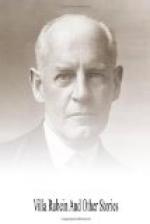After a long morning’s sitting the girls had started forth with Harz and Dawney to spend the afternoon at the ruin; Miss Naylor, kept at home by headache, watched them depart with words of caution against sunstroke, stinging nettles, and strange dogs.
Since the painter’s return Christian and he had hardly spoken to each other. Below the battlement on which they sat, in a railed gallery with little tables, Dawney and Greta were playing dominoes, two soldiers drinking beer, and at the top of a flight of stairs the Custodian’s wife sewing at a garment. Christian said suddenly: “I thought we were friends.”
“Well, Fraulein Christian, aren’t we?”
“You went away without a word; friends don’t do that.”
Harz bit his lips.
“I don’t think you care,” she went on with a sort of desperate haste, “whether you hurt people or not. You have been here all this time without even going to see your father and mother.”
“Do you think they would want to see me?”
Christian looked up.
“It’s all been so soft for you,” he said bitterly; “you don’t understand.”
He turned his head away, and then burst out: “I’m proud to come straight from the soil—I wouldn’t have it otherwise; but they are of ’the people,’ everything is narrow with them—they only understand what they can see and touch.”
“I’m sorry I spoke like that,” said Christian softly; “you’ve never told me about yourself.”
There was something just a little cruel in the way the painter looked at her, then seeming to feel compunction, he said quickly: “I always hated—the peasant life—I wanted to get away into the world; I had a feeling in here—I wanted—I don’t know what I wanted! I did run away at last to a house-painter at Meran. The priest wrote me a letter from my father—they threw me off; that’s all.”
Christian’s eyes were very bright, her lips moved, like the lips of a child listening to a story.
“Go on,” she said.
“I stayed at Meran two years, till I’d learnt all I could there, then a brother of my mother’s helped me to get to Vienna; I was lucky enough to find work with a man who used to decorate churches. We went about the country together. Once when he was ill I painted the roof of a church entirely by myself; I lay on my back on the scaffold boards all day for a week—I was proud of that roof.” He paused.
“When did you begin painting pictures?”
“A friend asked me why I didn’t try for the Academie. That started me going to the night schools; I worked every minute—I had to get my living as well, of course, so I worked at night.
“Then when the examination came, I thought I could do nothing—it was just as if I had never had a brush or pencil in my hand. But the second day a professor in passing me said, ‘Good! Quite good!’ That gave me courage. I was sure I had failed though; but I was second out of sixty.”




